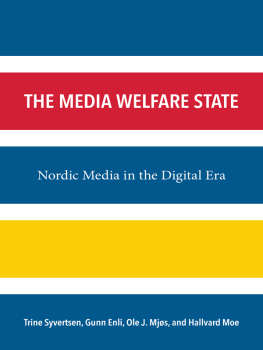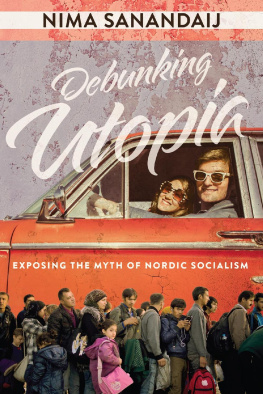KE SANDBERG (ED.)
NORDIC
LIGHTS
Work, Management and
Welfare in Scandinavia
Michael Allvin Gunnar Aronsson
Torsten Bjrkman Bo Blomquist Martha Blomqvist
Anders Boglind Anders Bruhn Christofer Edling
Tomas Engstrm Birgitta Eriksson Patrik Hall
Dan Jonsson Sten Jnsson Annette Kamp
Jan Ch. Karlsson Anders Kjellberg Christian Koch
Klas Levinson Lars Medbo Fredrik Movitz
Klaus T. Nielsen Helena Norman ke Sandberg
Egil J. Skorstad Anna Wahl
SNS Frlag
SNS Frlag
Box 5629
SE-114 86 Stockholm
Sweden
Phone:+46 8 507 025 00
Fax: +46 8 507 025 25
www.sns.se
SNS Centre for Business and Policy Studies is a non-partisan and independent non-profit organisation that contributes to decision makers in politics, public administration and business being able to make well-informed decisions based on science and factual analysis. This is done through research, meetings and the publication of books.
Nordic Lights. Work, Management and Welfare in Scandinavia
ke Sandberg (ed.)
First edition
First printing
2013 by ke Sandberg, the authors and SNS Frlag
Graphics and cover design: Allan Seppa
ISBN 978-91-8694-942-6
Ebook production: Publit, 2013
Contents
- 1. How Bright are the Nordic Lights?
ke Sandberg and Fredrik Movitz
- 2. Contested Models: Productive Welfare and Solidaristic Individualism
Fredrik Movitz and ke Sandberg - 3. Management: Still a Fashion Industry
Torsten Bjrkman - 4. A New World of Work Challenging Swedish Unions
Anders Bruhn, Anders Kjellberg and ke Sandberg
- 5. Volvo and a Swedish Organisation and Management Model
Anders Boglind - 6. Assembly Systems and Work in the Swedish Automotive Industry
Bo Blomquist, Tomas Engstrm, Dan Jonsson and Lars Medbo
- 7. When the Blues Meets the Blue Eye
Christian Koch - 8. Organisational Change and Resistance in Norwegian Working Life
Egil J. Skorstad - 9. Management of Working Environment
Annette Kamp and Klaus T. Nielsen
- 10. Gender in New Management
Martha Blomqvist
- 13. New Management and Good Work? A Swedish Experience
Christofer Edling and ke Sandberg - 14. NPM in Sweden: The Risky Balance between Bureaucracy and Politics
Patrik Hall - 15. Flexibility, Boundarylessness and the Strategies of Work
Michael Allvin and Gunnar Aronsson - 16. The New Economy Rhetoric and Interactive Media Workers
Fredrik Movitz - 17. Quality of Work and Product in Digital and Print Media
ke Sandberg and Helena Norman - 18. Employee Board Representation in the Swedish Private Sector
Fredrik Movitz and Klas Levinson
- 19. Swedish Research on Organisations and Management
Sten Jnsson
Foreword
The Nordic and Scandinavian countries have long been beacons for people around the world who were eager to see workplaces transformed into spaces where working people could express their humanity and aspirations. These countries have been famous for their sociotechnical forms of work organisation, dialogue based forms of management, collaborative union-management relations, and advanced training and welfare systems. Nation-wide collective bargaining agreements ensured the same pay for the same work regardless of the profitability of each company, and this encouraged rapid industrial adaptation. Government programmes supported vocational training and education, and this allowed workers impacted by that adaptation to transite to new jobs in growing sectors of the economy. These practices resulted in sustained and widely-shared prosperity.
This distinctive model of work and economy has, however, come under increasing pressure in recent years, as global capitalism asserts itself ever more forcefully and without the counterweight of any comparably globalized union movement or civil society. Across the region, and notwithstanding significant differences among firms and countries, union rights have come under attack. Employers have pushed toward the individualisation of pay. Workers themselves have shifted toward short-term and instrumental views of union membership. Several large-scale industries have declined and employment growth has shifted toward smaller service companies, with negative consequences for wage levels, job quality, job security, and union influence. This shift has been slowed down by a high union density, by strong workplace organisation and national confederations, and by a high rate of coverage by nationally agreed collective agreements. Nevertheless, vigorous action by conservative governments in the region has dealt damaging blows to the old model, through drastic funding cuts in the social insurance and the unemployment insurance system and in training for new jobs.
This volume affords us an opportunity to take stock of the changes to date and reconsider the path ahead. The editor has compiled an exceptionally rich set of essays. Various chapters cover management fashions; the impact of doctrines of new public management and privatizations in the public sector; the challenges posed to workers and unions by business process reengineering and lean production; how Volvos distinctive work and management philosophies have fared under the companys new owners, Ford; changing management approaches to the work environment; evolving forms of worker resistance; changing gender dynamics in the workplace; trends towards flexibility and boundaryless work; work in media companies and journalism; and the challenges posed to the system of employee board representation as a result of financialisation.
Readers will find not only rich empirical accounts but also equally rich theoretical perspectives. Whereas much Anglo-Saxon research on work has focused on the content and consequences of management doctrines and practices, comparable Nordic and Scandinavian research has given greater weight to the independent role of unions and workers. As a result, this research is particularly informative both in its analysis of the team-work alternatives to the Taylorist and Fordist models that dominated much industrial practice in the twentieth century, and in its analysis of the broader context in politics, the economy and the labour market that made such alternatives possible.
We all have much to learn from the experience and insight reflected in this set of essays.
Los Angeles, April 2013
Paul S. Adler
Professor of Management and Organization
University of Southern California
Preface
This book has grown out of research based in a long Swedish and Scandinavian experience of and belief in welfare, qualifications, dialogue, equality, autonomy and democracy at work, both as goals in themselves and as means to economic development. Is this too rosy a picture? The book gives critical Scandinavian perspectives, Nordic lights on management and the new working life, in Scandinavia and elsewhere.
This volume is about work, organisation, management and welfare in Scandinavia, in the Nordic countries: management fashions, New Public Management (NPM), Business Process Reengineering (BPR), Lean Production, challenges for trade unions, Volvos work and management meeting Ford and Toyota, work environment management, worker resistance, gender and management, the flexible firm, boundaryless work, the media and journalists work, interactive media and the new economy are among the themes discussed.








